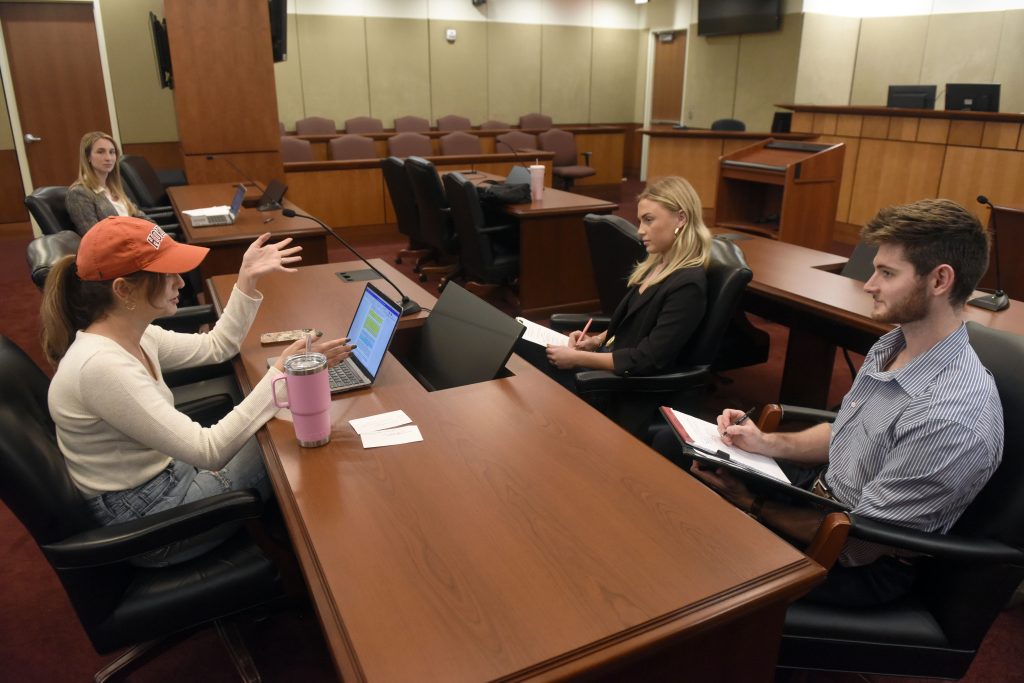Legal Method & Communication Program

Legal Writing at its Best
Elon Law’s Legal Method & Communication Program provides students with the rigorous, innovative instruction in legal research, writing, and oral communication that will help them become effective practitioners.
Led by Interim Director Caroleen Dineen, the LMC Program involves professors and mentors who operate across the law school curriculum. Dual-degreed lawyer/librarians teach legal research, and students can visit the Elon Law Writing Lab for individual assistance from a writing specialist. Every student works with an executive coach to develop speaking skills, in addition to advocacy skills honed in Elon Law’s extensive Trial Practice Program.
Our first-year curriculum consists of Legal Method & Communication I, II and III (each worth two credits) and a Legal Research course (one credit) that runs from October to March. Students are placed in the role of law clerk, lawyer or judge from their first day of class. Research and writing assignments are presented via a series of simulations during which students watch client interviews, provide research and objective advice to a supervisor, maintain client files and time sheets, prepare written and oral progress reports for a supervising attorney, write and orally argue motions on behalf of a client, write a brief to an appellate court, and deliver a formal oral argument to a panel of judges.
Topics in the fall term include reading legal authorities, understanding the structure of legal rules, traditional organizational paradigms in the legal field, legal citation, rule-based reasoning, case synthesis and common law analysis. Winter and spring terms provide numerous opportunities to practice these skills while studying more advanced topics, such as statutory interpretation and analysis, persuasive writing techniques, classical rhetorical devices, and types of legal argument.
Students learn in Legal Research how to find and evaluate primary and secondary legal authorities, and how to perform cost-effective legal research using both hard copy and electronic resources. They research procedural law and court rules in conjunction with writing assignments that give considerable attention to the importance of audience, tone, and purpose. Students also are introduced to the ethical and professional implications of the lawyer’s dual roles of advocate and officer of the court.
All upper-level students complete an advanced writing requirement and an off-campus residency placement. The advanced writing requirement can be satisfied by taking an advanced writing course such as Business Drafting, writing a law review note or seminar paper, or completing another writing-intensive course or project. During their signature residency-in-practice experience, a hallmark of Elon Law’s experiential curriculum, students perform a variety of research, writing and advocacy projects for placement supervisors.
In Their Own Words: Bridging Theory to Practice
We asked students about the value of legal writing in shaping their summer work experiences. Here’s what they had to say.
Melo Augustine L'24: Hitting the Ground Running

“I interned over the summer between my first and second year with an in-house attorney at a credit union. One of my first assignments was drafting a legal memo concerning parent-subsidiary liability. The memo aimed to answer the following question: when might a parent face liability for its subsidiary’s actions? Having taken LMC, I knew how to communicate the answer in a well-structured, readable, and concise manner. LMC truly helped me hit the ground running.”
Nicolette Eddy L'23: Confidence in Producing Strong Work Products

“Legal Methods & Communications developed my legal research and writing skills and prepared me for my summer work experiences. In my second summer of law school, I worked at Benesch, Friedlander, Coplan & Aronoff in Cleveland as a summer associate. As a summer associate, I worked on many different legal projects that required excellent legal research and drafting skills. When I received drafting assignments, I felt confident in my ability to produce a good work product for the assigning attorney because of my strong researching, drafting, and editing skills from my experience as a teaching assistant. I am grateful for the opportunity to work with my students to develop both our legal research and writing skills.”
Jordon Inzerillo L'24: Preparation for When the Stakes are High

“I remember spending countless hours scouring over my appellate brief, thinking there was no way anyone could or would pay attention to every sentence of every paragraph of the 20-plus pages I had written. Then I spent the summer with Judge Bill Davis, working on documents I had never heard of, whose length and topic coverage put my brief to shame.
“I was tasked with copy-editing drafts of the Termination of Parental Rights Orders that long-time practicing attorneys or judicial fellows wrote. It was my job to take a red pen and dissect every error. As I grew over the summer, I was given the opportunity to write my own Emergency Custody Orders and various other Orders for the judge.
“Legal Methods and Communications built the habits and skills that allowed me to work through the massive documents, catching errors in grammar and facts of cases with which I had little to no familiarity. The attention to detail I picked up in Legal Methods & Communication was highly beneficial when working on the TPRs. Every fact or comma matters when something as important as a child’s welfare is at stake or a parent losing custody of their child.”
Writing Advice from a Distinguished North Carolina Jurist
The Hon. Mark Davis served as Elon Law’s 2021 Visiting Distinguished Jurist in Residence. In this video, which has been viewed thousands of times since that spring, Judge Davis offers five tips for writing effective appellate briefs.
The 2021 Carolinas Colloquium
The Carolinas Colloquium is a biennial event hosted on a rotating basis by law schools in North Carolina and South Carolina for legal research and legal writing faculty to exchange new ideas and best practices on teaching and scholarship. Elon University School of Law hosted the 2021 event in hybrid format. Nearly half of 60 registered participants attended in person in downtown Greensboro, North Carolina on June 24, with others joining via Zoom.